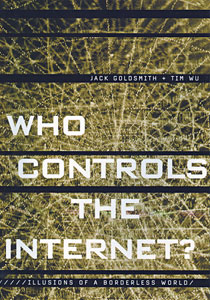home | metro silicon valley index | the arts | books | review

Who Controls the Internet? Illusions of a Borderless World
REVIEW (By Jack Goldsmith and Tim Wu; Oxford University Press; 226 pages; $28 cloth)
—Michael S. Gant
Once upon a time, the web was going to dissolve national boundaries and set us free. But as Google learned in China, nations still exert "coercive governmental force," even in cyberspace. Law professors Jack Goldsmith and Tim Wu analzye the ways in which territorial laws can be used to trump the transnational architecture of the Internet. For starters, different nations still speak different languages and want web experiences that reflect "local differences in history, culture, geography and wealth." Some countries, China in particular, have become adept at technological innovations that allow for invisible censorship. New York Attorney General Eliot Spitzer fought offshore gambling websites by threaten to prosecute "local financial intermediaries" like credit card companies and PayPal. One special danger of the bordered Internet is that media websites might "conform their content to the laws of the most restrictive nation." Who Controls the Internet? should serve as a warning to complacent cybernauts who thought they could make nation-states disappear with the click of a mouse.
Send a letter to the editor about this story.
|
|
|
|
|
|